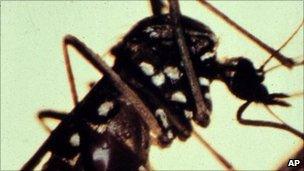Deadly disease major threat to global public health
- Published

Dengue is spread by mosquitoes
The number of cases of a deadly disease has more than doubled in the last decade, according to the World Health Organization (WHO).
Dengue outbreaks are now a major threat to global public health.
The UN health agency warned that unless countries act now then the situation will only get worse.
Two fifths of the world's population are at risk of the disease, with the majority living in the Asia Pacific region.
Cases double
Dengue is a serious flu-like illness that is transmitted by mosquitoes, and can develop into dengue haemorrhagic fever, which can be fatal.
The disease is spread by the aedes aegypti mosquito.
The WHO has warned that the increased number and size of dengue outbreaks in some countries in the Western Pacific region, as well as cases recorded in previously unaffected areas, are signs that firmer action cannot be delayed.
The WHO's regional director for the Western Pacific, Dr Shin Young-soo, said:
"National resources need to be mobilized to sustain dengue prevention and control, and the disease's profile needs to be raised on the global health agenda to stimulate the interest of international agencies and donors.
"The fight against this disease is everybody's problem."
The number of cases in the Western Pacific Region has more than doubled over the past 10 years.
There has been a significant increase in many countries this year alone.
The Lao People's Democratic Republic and the Philippines appear to be particularly affected.
2.5 billion at risk
Two-fifths of the world's population is at risk of the disease.
Out of these 2.5 billion people, more than 70% live in Asia Pacific countries.
The warning was delivered at the WHO's Regional Committee for the Western Pacific.
The increased number of outbreaks may be caused by a number of factors; including higher temperatures and rainfall which produce perfect breeding conditions for the mosquitoes that carry the disease.
Growing populations, particularly in cities, and greater international travel by infected individuals could also explain the rise.
The WHO says there is as yet no clear evidence that the increase in cases was due to global warming.
But changes in climate do affect mosquitoes which spread the disease.
At a local level eliminating breeding sites like water jars, building sites and discarded garbage is essential in reducing the number of mosquitoes.
But a concerted international effort is vital, with urban planning and improving sanitation essential to reducing the number of dengue cases.